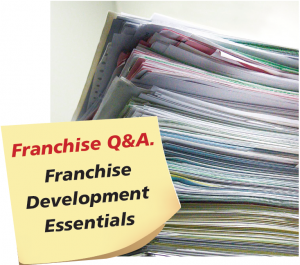 Franchising your business is certainly a challenge. Not everyone can be a good and efficient franchisor. The same can be said for franchisees. Interestingly, the International Franchise Association (IFA) claims that those above 50 years of age make good franchisees. The reason for this being, they possess three critical skills needed to be a successful franchisee: confidence, the ability to plan and strong interpersonal skills. IFA further supports their claim stating that “Having been adults for at least three decades, they clearly understand that anything in life worth having takes hard work and effort. They’re realists.”
Franchising your business is certainly a challenge. Not everyone can be a good and efficient franchisor. The same can be said for franchisees. Interestingly, the International Franchise Association (IFA) claims that those above 50 years of age make good franchisees. The reason for this being, they possess three critical skills needed to be a successful franchisee: confidence, the ability to plan and strong interpersonal skills. IFA further supports their claim stating that “Having been adults for at least three decades, they clearly understand that anything in life worth having takes hard work and effort. They’re realists.”
However, regardless of how skillful a franchisee or franchisor is, there are technical areas to which both parties must pay attention, to avoid his or her franchise being considered unlawful in Malaysia. Let us visit some of the questions franchisors and franchisees should ask themselves or their Franchise Consultants before proceeding to expand their outlets in Malaysia through the franchise system (for the franchisors) and before investing in a franchise (for the franchisees).
Question 1:
What kind of documentation is needed for franchising?
To register the franchise with the Registrar of Franchise in Malaysia, the following documents must be lodged at the Franchise Registry (located in Putrajaya) by the franchisor:
I. A Franchise Agreement
II. A Disclosure Document (Form BAF1)
III. Registration Application Form (Form BAF2)
IV. Operation Manual
V. Training Manual
VI. Certificate of Incorporation
VII. Forms 24 and 49 (Company’s return as to the Board of Directors and the Shareholders)
VIII. Form of Annual Return of a company having a share capital
IX. Latest audited balance sheet and profit and loss account
X. Company’s organizational chart, together with the names and position of key personnel
XI. Company’s business brochures
All of the above documents must be certified true copies of the document. The cost of the application is merely RM50.00, whereas the registration fee of the franchise is RM1,000.00. If the documentation is insufficient, the Registrar has the discretion to request for more information or documents.
The entire application and registration of the franchise process can be completed as quickly as two (2) months or may take up to slightly more than six (6) months in certain cases. The Registrar of Franchise has the power to approve or refuse a franchise registration. Be that as it may, in the event the franchise is refused, the Registrar must furnish a reason for the refusal.
Fortunately, most of the documents listed above are clear and do not require further explanation. However, you may ask what is a Disclosure Document? Well, the name of the document implies what it is! A Disclosure Document comprises of documents that have to be made available by the franchisor to the franchisee at least ten (10) days before the franchisee signs the franchise agreement. The Disclosure Documents provided to the franchisee must be identical to the documents submitted to the Registrar.
The Disclosure Document must be submitted to the Registrar with the relevant form (BAF1). The information and documents required in the disclosure document are as follows:
I. Front Cover containing the name of the franchisors, a declaration and date the document is signed.
II. Background of the franchise. This will include information such as principal business address of the franchisor*, trade name and trademark of the franchisor*, type of business of the franchisor*, business of the franchisee, where the franchisor has been in operation prior to 8th October 1999 and the list of franchisee’s names and addresses and business experience of the franchisor, in the franchised business and in any other business.
III. Details of personnel. This will include the organizational chart, the names and designation and working experience of franchisor’s board of directors and senior executives and if a management company will be handling the franchise for the franchisor, the details of the management company.
IV. Information on past or pending legal actions in Court against the franchisor or directors.
V. Statement on whether the franchisor or its directors have previously been declared bankrupt.
VI. Franchise fee and other initial fees imposed, types of fees imposed, time when fees are payable*.
VII. Other fees charged (for example, service fees, maintenance fees, training fees, advertising fees, etc) and whether they are refundable*.
VIII. Initial investment of the franchisee*.
IX. Obligation of the franchisee to purchase or lease equipment from the franchisor or sources designated by the franchisor*.
X. Obligation of the franchisee to purchase or lease based on the franchisor’s specification*.
XI. Financing arrangement.
XII. Franchisor’s obligations prior to operation*.
XIII. Territorial rights*.
XIV. Trademark and intellectual property rights*.
XV. Whether the franchisee has to operate the business full-time*.
XVI. Whether there exists any restriction on goods or services to be sold*.
XVII. Renewal, termination and modification of franchise agreement*.
XVIII. Information regarding the franchises of the franchisor.
XIX. Financial statement for the last three financial years and forecast for the next three years.
XX. Awards and recognition.
As many of the items specified above (marked with *) should also be stated in the Franchise Agreement, the documents overlap to a certain extent. It is therefore advisable that the Disclosure Document and the Franchise Agreement are prepared at the same time and the information in both documents is kept identical.
A word of warning is required at this stage! Franchisors need to ensure that the details provided in the Disclosure Document is accurate as they can be found to be committing an offence in the event there is any misleading, untrue or fraudulent statements in the Disclosure document.
With the important Disclosure Document discussed in detail, we can continue to the next technical question franchisors and franchisees should ask themselves before embarking a franchise journey.
Question 2:
What are essential terms of a Franchise Agreement?
The Malaysian Franchise Act 1998, which regulates the franchise industry in Malaysia, stipulates that a franchise agreement must contain basic clauses, without which the agreement will be considered null and void. A franchise agreement shall contain but is not limited to:
a. the name and description of the product and business under the franchise;
b. the territorial rights granted to the franchisee;
c. the franchise fee, promotion fee, royalty or any related type of payment which may be imposed on the franchisee, if any;
d. the obligations of the franchisor;
e. the obligations of the franchisee;
f. the franchisee’s rights to use the mark or any other intellectual property, pending the registration or after the registration of the franchise;
g. the conditions under which the franchisee may assign the rights under the franchise;
h. a statement on the cooling off period;
i. a description pertaining to the mark or any other intellectual property owned or related to the franchisor which is used in the franchise;
j. if the agreement is related to a master franchisee, the franchisor’s identity and the rights obtained by the master franchisee from the franchisor;
k. the type and particulars of assistance provided by the franchisor;
l. the duration of the franchise and the terms of renewal; and
m. the effect of termination or expiration of the franchise agreement.
The two items listed above that may be difficult for franchisors to comply with are items (h) and (j), the first being the “cooling off” period. This is a requirement by the Act that is not exclusive to Malaysia (Australia practices the cooling off concept as well). The cooling off period requires the franchisor to provide the franchisee with an option to terminate the agreement within at least seven (7) days of entering into the agreement. Upon such termination, the franchisor has to refund the payment made by the franchisee, after deducting the expenses incurred in preparing the agreement and other documentation for the purpose of franchising. The franchisee, in return, has to hand back all the documentation and information obtained from the franchisor with regards to the franchise.
This cooling off period is a term in the agreement that usually comes as a surprise to franchisors. Other agreements do not have such a term and it is natural as both parties should read the terms of an agreement prior to signing the agreement. This cooling off period allows a party to get out of an agreement that he or she has committed to within seven (7) days, even after he or she has signed the agreement!
As for the second item that may induce reluctance in franchisors, i.e. the need to provide details of the master franchisor, this requirement, like the cooling off period, is intended to protect the franchisee. With these details, the franchisee can be assured that the franchisor is providing accurate details and does in fact own a master franchise for a specific territory. To safeguard the franchisor’s interest and rights, the franchisor can limit the franchisee’s contact with its master franchisor by including a term that restricts contact between the parties without prior consent from the franchisor.
On the whole, the specific requirements of the Franchise Act must be taken into account when the franchisor is preparing the documentation needed to register its franchise in Malaysia, be it the Disclosure Document, the Franchise Agreement or anything else. As technical and dull as the preparation of such documents may be compared to the actual job of opening the outlet, training the staff and running the franchise, you do not want to be caught out by simple technical glitches that could have been avoided!
 Geetha K. is the Director of Trademark and Industrial Designs Division at KASS International. She has extensive experience in handling all aspects of trademarks and designs in various industries, including pharmaceutical, food & beverage, property development, automotive and apparel industries, and manages local, regional and international portfolios. She drafts franchise agreements, assists with the registration of franchises and advises Franchisors and Franchisees. She has also written articles for various local and overseas publications, such as the Institute of Trade Mark Attorneys (ITMA) magazine. Her comments on case law in Malaysia and Singapore have also been quoted in publications abroad such as Asia IP magazine and Managing Intellectual Property magazine, a Euromoney Publication (UK). If you have any queries or need more information, please visit www.kass.com.my or drop an e-mail to ipr@kass.com.my.
Geetha K. is the Director of Trademark and Industrial Designs Division at KASS International. She has extensive experience in handling all aspects of trademarks and designs in various industries, including pharmaceutical, food & beverage, property development, automotive and apparel industries, and manages local, regional and international portfolios. She drafts franchise agreements, assists with the registration of franchises and advises Franchisors and Franchisees. She has also written articles for various local and overseas publications, such as the Institute of Trade Mark Attorneys (ITMA) magazine. Her comments on case law in Malaysia and Singapore have also been quoted in publications abroad such as Asia IP magazine and Managing Intellectual Property magazine, a Euromoney Publication (UK). If you have any queries or need more information, please visit www.kass.com.my or drop an e-mail to ipr@kass.com.my.






